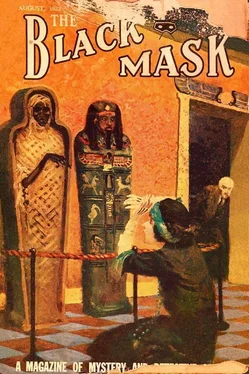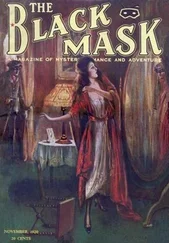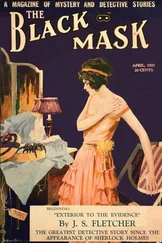John Baer - The Black Mask Magazine (Vol. 5, No. 5 — August 1922)
Здесь есть возможность читать онлайн «John Baer - The Black Mask Magazine (Vol. 5, No. 5 — August 1922)» весь текст электронной книги совершенно бесплатно (целиком полную версию без сокращений). В некоторых случаях можно слушать аудио, скачать через торрент в формате fb2 и присутствует краткое содержание. Город: New York, Год выпуска: 1922, Издательство: Pro-Distributors Publishing Company, Жанр: Детектив, на английском языке. Описание произведения, (предисловие) а так же отзывы посетителей доступны на портале библиотеки ЛибКат.
- Название:The Black Mask Magazine (Vol. 5, No. 5 — August 1922)
- Автор:
- Издательство:Pro-Distributors Publishing Company
- Жанр:
- Год:1922
- Город:New York
- ISBN:нет данных
- Рейтинг книги:4 / 5. Голосов: 1
-
Избранное:Добавить в избранное
- Отзывы:
-
Ваша оценка:
- 80
- 1
- 2
- 3
- 4
- 5
The Black Mask Magazine (Vol. 5, No. 5 — August 1922): краткое содержание, описание и аннотация
Предлагаем к чтению аннотацию, описание, краткое содержание или предисловие (зависит от того, что написал сам автор книги «The Black Mask Magazine (Vol. 5, No. 5 — August 1922)»). Если вы не нашли необходимую информацию о книге — напишите в комментариях, мы постараемся отыскать её.
The Black Mask Magazine (Vol. 5, No. 5 — August 1922) — читать онлайн бесплатно полную книгу (весь текст) целиком
Ниже представлен текст книги, разбитый по страницам. Система сохранения места последней прочитанной страницы, позволяет с удобством читать онлайн бесплатно книгу «The Black Mask Magazine (Vol. 5, No. 5 — August 1922)», без необходимости каждый раз заново искать на чём Вы остановились. Поставьте закладку, и сможете в любой момент перейти на страницу, на которой закончили чтение.
Интервал:
Закладка:
The Black Mask Magazine (Vol. 5, No. 5 — August 1922)
by F. M. Osborne (editor)
Contents

Blueberry Pie
[complete mystery novelette]
by Thyra Samter Winslow
I
The Laurence Martins were at breakfast. It was a most charming domestic scene. The dining-room, though small, was one-fourth of the Martin’s North Side Chicago apartment.
The table of black enamel was set daintily with a blue and white runner and with blue and white Canton china. In the center was a vase holding four jonquils. The blue and gold cretonne curtains made the thin March sunshine seem almost as gold as Irma Martin’s smooth bobbed hair. The Martins had been married just four months.
Irma Martin turned the toast in the electric toaster at her elbow. She poured coffee. Then, her hand trembling a little, she picked up the morning paper and started to read. Martin was already scanning the headlines of his own newspaper which he would read more thoroughly on his way to the office. He glanced at his wife.
“Irma,” he said, and then, as she didn’t answer, “Irma.”
“Speak to me?” she looked over at him.
“What’s the matter, dear?” he asked. “You look pale. I don’t believe you slept well. I heard you tossing.”
“You’re a darling to worry,” she smiled at him. “It’s really nothing. I was — a — a little restless. Not sleeping makes me pale, I suppose.”
He looked at her hand, holding the paper.
“Why, child, you’re trembling.”
She got up, then, went over, put an arm around his shoulder, her cheek against his hair.
“You are nice,” she said. “I think it’s just nerves. But I’m lots better than I was. You said so, too. You watch — I’ll improve. I’m the nervous sort — all my folks were, too.”
“What have you got to be nervous about? A beautiful Spring day... I honestly believe, Irma, if you didn’t read the papers so much — got your mind on other things — reading things like this, now...” he pointed to a glaring headline.
“I know. I shouldn’t have read it. I suppose that was it. I’ll forget it in fifteen minutes. It does seem — awful, though. I’m going downtown with Lois Britton. We’re going to look at bedroom curtains and slippers.”
Martin looked at his paper again.
“That’ll be fine,” he said. “I can’t blame you — reading a thing like this. An awful thing. That was a terrible murder. Glad the papers will be through with it, now. How that beast ever went on proclaiming his innocence to the end — I see he did — is more than I can figure out. I don’t believe in capital punishment, as a rule, but in a case like that — when a man deliberately murders an innocent little woman — electrocuting is none too good for him. He deserved all he got.”
“I–I suppose he did,” agreed Irma.
“Of course. You’re the softest-hearted little thing in the world, or you wouldn’t be trembling, now. I ought to have kept the paper away from you. Though I can’t blame you, if a thing like this gets on your nerves. You were in New York when it all happened?”
“No, it was just a few weeks after I got there. I remember reading it in the papers. Just coming from New York and the woman having light bobbed hair and all, I felt terribly interested.”
“I suppose you did. That’s right, you came here in July, didn’t you? I bet you never thought, when you left New York, that you’d meet the man you were going to marry within a month, did you?”
“You bet I didn’t. Nor that I’d marry him six months after I did meet him. Marry in haste, you know... You sorry, yet?”
“I should say not. Marrying you is the one best thing I ever did, Irma. You know that. Now sit down and finish your toast. I’m late again.”
Irma went back to her seat across the table. They talked about little things, about Irma’s coming to Chicago, when the aunt with whom she had lived in New York had died, how she just happened to pick out Chicago because she had never been West, how she had met Martin’s cousin at the Y. W. C. A., where she had taken a room, and how the cousin and she had found a place to live together and had gone job hunting, and how Irma had met Martin a few weeks later, with “love at first sight.” “... and here we are, with a little apartment and married and everything...”
Martin looked at his watch. He grabbed his paper, his hat and his coat and said, cheerfully:
“Now put that awful murder case out of your mind, won’t you?”
“You bet I will.” Irma kissed him and the door slammed.
But little Mrs. Martin did not put the murder case out of her mind. She sat there, with the paper before her and read over that awful headline:
Then, under an Ossining date line, followed the full details of the electrocution, the crime and the trial.
Irma shuddered as she read the story to the end, the last day of the condemned man, the résumé of the brutal deed. It was enough to make anyone shudder.
II
The details of the Dennison case are well-known to the average American. For the average American is a newspaper reader, and no reader of newspapers could neglect the fruity details of that tragedy. It contained all of the elements that make newspaper readers.
A fairly well-to-do young man of around thirty, just before an announcement of his engagement to a young woman in his own social set was to have been made, murders the young woman — hardly more than a girl — with whom he had shared an apartment for two years previous. The details, the murder itself, the plan to make the murder look as if a burglar had committed it, the little things which the murderer could not foresee, but which proved his guilt; the trial, and now the electrocution, were all spectacular, fascinating, in a morbid, gruesome way.
The first the public knew was on a morning in July. The people in the apartment building in the West Hundreds were told by their sense of smell that something was wrong. Horribly unpleasant, right from the start. The janitor and then a plumber visited several apartments, found nothing. The plumber decided the unpleasant odors came from an apartment on the third floor. This was occupied by a Mr. and Mrs. Stuart Dennison. At least, they were supposed to be Mr. and Mrs. Dennison, though the acquaintances of Mrs. Dennison, who was a friendly little soul, knew that no marriage existed, that the girl was really named Irene Graham. Realizing that the irregular relations were but one of the incidents of city living, the neighbors thought none the less of Miss Graham. On the contrary, their own regular lives bored them, and they rather welcomed her. She was a pleasant, frank little thing, always telling them little confidences, asking advice. Until just a few months before, she had been awfully happy, full of gay little stories. Since then, she had been wistful, sad, because Dennison was no longer kind to her.
When the plumber wanted admission into the Dennison apartment, the janitor, a fellow by the name of Schmidt, told him that there was no one at home, there. He, himself, had been told by Mrs. Dennison that she and Dennison were going away for a vacation of several weeks. Mrs. Dennison had been quite excited over going. In fact, Schmidt had brought up from the basement two trunks and several suitcases. One of the trunks had left in the morning, a whole week ago. He had seen it leave. The other one had gone away later in the day, and then Mrs. Dennison had had it sent back from the station. She had met him in the hall, he remembered, and told him that the second trunk had contained bedding which they weren’t going to need, after all. Mrs. Dennison had gone on up into her apartment — had said that Dennison would come for her and they were going to leave together, later. No, he hadn’t seen them leave, but there hadn’t been lights there since, nor the noise of anyone walking around. So they had evidently left that night, as they had planned, and not returned. He knew that. When the plumber insisted, Schmidt handed over his master’s key.
Читать дальшеИнтервал:
Закладка:
Похожие книги на «The Black Mask Magazine (Vol. 5, No. 5 — August 1922)»
Представляем Вашему вниманию похожие книги на «The Black Mask Magazine (Vol. 5, No. 5 — August 1922)» списком для выбора. Мы отобрали схожую по названию и смыслу литературу в надежде предоставить читателям больше вариантов отыскать новые, интересные, ещё непрочитанные произведения.
Обсуждение, отзывы о книге «The Black Mask Magazine (Vol. 5, No. 5 — August 1922)» и просто собственные мнения читателей. Оставьте ваши комментарии, напишите, что Вы думаете о произведении, его смысле или главных героях. Укажите что конкретно понравилось, а что нет, и почему Вы так считаете.












